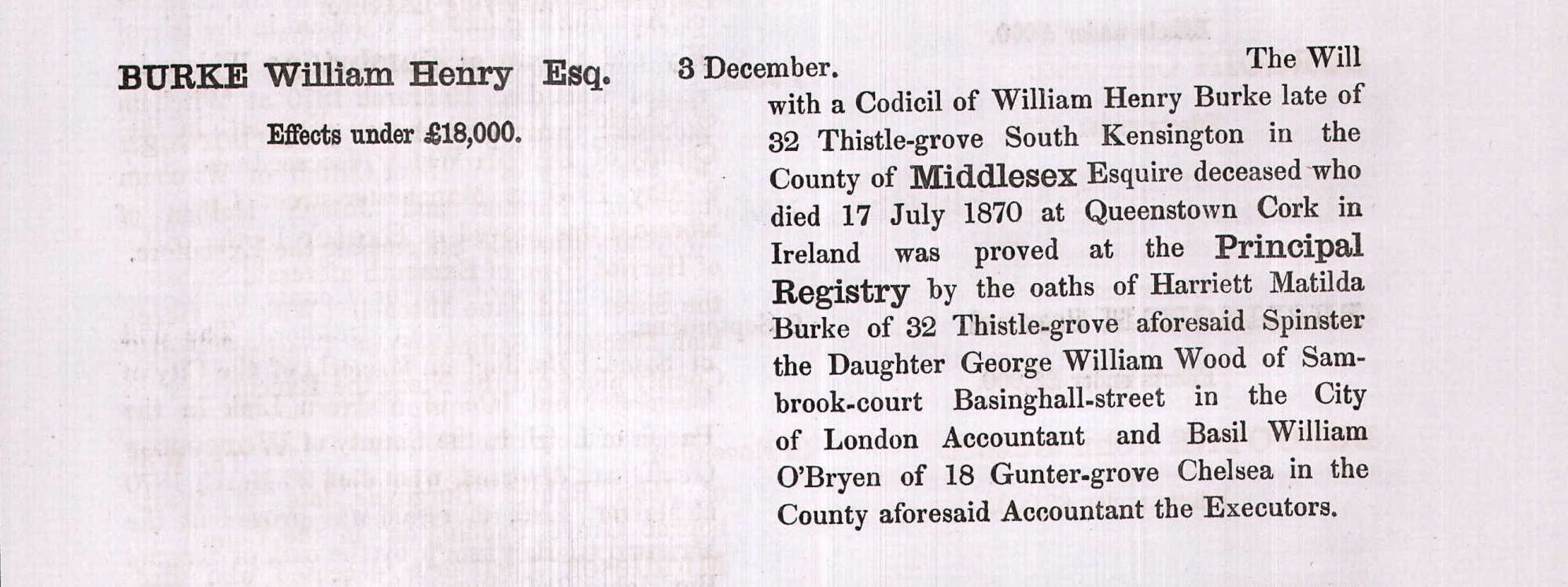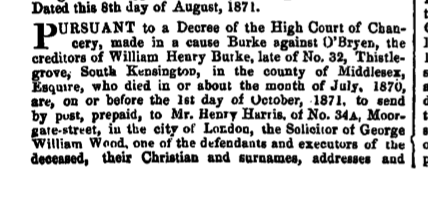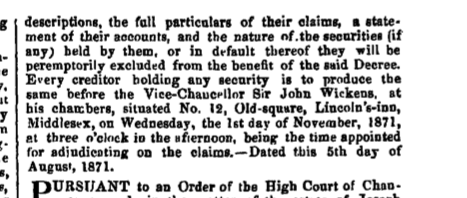For reasons I’m not entirely sure why, there has been a large increase in interest in the post I did just over two years ago about the will of William Henry Burke (1792-1870). In fact there has been a 375% increase in views this year, compared with 2016. Neither the post about his will, nor another one about him posted about the same time give many, or indeed any, clues as to why it is there. Both posts were very early ones in the history of this site, and like a lot of the early posts are almost like cuttings in a scrapbook, not clearly explaining themselves. This is the first of a series of posts that should explain a lot more. My starting point for looking at William Burke was one of his sons-in-law Basil O’Bryen.
William Henry Burke and John Roche O’Bryen [Basil’s father] were neighbours in South Kensington, both living in Thistle Grove [now Drayton Gardens, not to be confused with the current Thistle Grove, parallel with Drayton Gardens]. Both men drew up new wills in May 1870. On the 6th May in William Henry Burke’s case, and ten days later on the 16th May by JROB. William Burke witnessed John Roche O’Bryen’s will, and John Roche O’Bryen’s youngest adult son from his first marriage, Basil O’Bryen, was one of the executors of William Henry Burke’s will, along with WHB’s daughter Harriet, and an accountant. JROB also drew up a Deed of Settlement on the 13th May 1870, in favour of Harriet Burke, with his wife Celia, and daughter Corinne [Basil’s older sister] as trustees. This was presumably a Marriage Settlement as Basil O’Bryen and Harriet Burke married in 1871.
So far, it all appears fairly straightforward. Two families who have grown close, and about to be linked by marriage. But something about it just niggles slightly, and has almost from the start. The closer one looks the more of a story there seems to be. For a start, both men were dead within months of drawing up the wills, and trust settlements. With almost perfect symmetry, William Henry Burke lasted seventy-two days, dying on the 17th July 1870, at Queenstown [now Cobh] in Cork; John Roche O’Bryen lived a day less, dying seventy-one days after signing his will, on 26th July 1870 at home in Thistle Grove in London. William Burke was seventy-eight years old, and JROB was sixty.
So both men may have just been putting their affairs in order, and a forthcoming marriage, and the need for a marriage settlement may have just prompted the work, or it might have been something else.
This prompted me to look at the families, and to who in each family was doing what. John Roche O’Bryen had a lot of children, well more accurately had had a lot of children. In total, he had sixteen, starting in 1833, when he was twenty-three, and finishing thirty-four years later in 1867 at the age of fifty-seven. There were ten children from his first marriage to Eliza Henderson, of whom only three survived to adulthood, and six children from the second marriage to Celia Grehan, of whom five survived to adulthood. At the time he drew up his will, JROB had three adult children, and six under the age of twelve, the youngest being two and a half.
William Henry Burke’s family is easier. He had three children with Sarah Penny, who he married in 1827. All of William’s children were over thirty, and at the time of his death, his eldest daughter was forty.
Both men had three adult children to choose from as executors, and trustees, and they appeared to make some slightly odd choices, given the possibilities. The Burke children were
- Elizabeth Sarah (1829 – 1889)
- William Henry ( 1835 -1908)
- Harriet Matilda (1838 – 1873)
and JROB’s adult children were
- Henry Hewitt (1835 – 1895)
- Corinne Margueritte (1837 – 1907)
- (William Gregory) Basil (1848 – 1920)
So the next step was to look at the trustees and executors. The Illustrated London News, on Jan 14, 1871, told us that William Henry Burke’s will was proved by “Miss Harriett Matilda Burke, his daughter, George William Wood, and Basil William O’Bryen, the joint acting executors.” John Roche O’Bryen’s will was proved eighteen days after his death by his widow Celia, and Rev. Henry Hewitt O’Bryen D.D. the executors. This seems perfectly suitable, Henry is the eldest son, thirty-five years old, a doctor of divinity, and a Catholic parish priest just outside Wigan. How close the relationship between father and son was is never really that clear. Henry started training for the priesthood in his late teens, and aged twenty transferred his sponsoring diocese from Clifton, where the family home in Bristol was, to Liverpool. He then studied, and was ordained in Rome, before returning to Liverpool in 1858. Their paths crossed for a couple of years in Liverpool between 1858 and 1860, when JROB practised as a doctor there, but by 1861 John Roche O’Bryen and his family with Celia Grehan [Henry’s step-mother] had moved to London.
William Henry Burke’s executors are much odder. Here’s part of the reason why
WHB’s executors are his youngest daughter, her fiancé Basil, and an accountant. This always seemed to be slightly strange. William Henry Burke had three children, and at the time he wrote his will, his eldest daughter Elizabeth Sarah was forty years old , and had been married for fourteen years, a mother of five, her eldest son was about eleven years old. His only son William Henry, known as Henry, was thirty-five, had been married nearly nine years, and was the father of four children, with another one on the way. Yet the choice of executors was the youngest unmarried daughter, and her much younger fiancé.
Right from the start, this raised the question – Why these two? Basil O’Bryen had stood out very early on. Mostly, because he is a bit of a bounder, to put it mildly. Basil married three times, at least once bigamously [at least according the English law] in Australia. The legal position in Australia was more complicated. Apparently re-marriage after seven years of no contact with a previous wife was legal in Australia. What is beyond dispute is that he abandoned his son from his marriage to Harriet, and his second wife and their two children, and moved to Australia, where he married his third wife.
So with the benefit of hindsight, Basil does appear to be a wrong’un; which brings us back to WHB’s will, or more specifically, at this stage to the probate notice. Two things stand out, the first is that Basil is described as an accountant, and the second is his address is given as 18 Gunter Grove. In 1870, Basil is twenty-two, and four years into an apprenticeship with Charles Rowsell, an accountant based in Walbrook, in the City, just down from the Mansion House. So maybe he is just being economical with the truth, he is a sort of accountant. But the Gunter Grove address is very confusing. It’s about three quarters of a mile away from Thistle Grove, but it does seem peculiar that he is not in the family home. He’s fairly young, as yet unmarried, and it seems unlikely that he would bother living away from the family home. 18 Gunter Grove, if he was living there, is a big house. The next piece of the jigsaw came from in a notice in the London Gazette
The London Gazette, December 9, 1870
WILLIAM HENRY BURKE Esq Deceased
Pursuant to the Act of Parliament of the 22nd and 23rd Vic cap 35 intituled An Act to further amend the Law of Property and to relieve Trustees
NOTICE is hereby given that all persons having any claim, debt, or demand against or upon the estate of William Henry Burke late of No 32 Thistle grove South Kensington in the county of Middlesex Esq (who died on the 17th day of July 1870 and whose will with a codicil thereto was proved in the Principal Registry of Her Majesty’s Court of Probate on the 3rd day of December 1870 by Harriet Matilda Burke of No 32 Thistle grove South Kensington aforesaid Spinster George William Wood of No 4 Sambrook court Basinghall street in the city of London Accountant and Basil William O Bryen of No 28 Thistle grove South Kensington aforesaid Accountant are hereby required to send in the particulars of their claims debts or demands to the said George William Wood one of the said executors at his office No 4 Sambrook court Basinghall street in the city of London on or before the 1st day of February 1871 after which day the said executors will proceed to the assets of the deceased among the parties entitled thereto having regard only to the claims debts or demands of which they shall then have had notice and the said executors will not be liable for any part of such assets to any person or persons of whose claim debt or demand they shall not then have had notice Dated this 7th day of December 1870.
WILLIAM GILLS Solicitor, No. 26, Old Broad –street, E.C.
So perhaps the National Probate Calendar (Index of Wills and Administrations) entry is wrong, but it is surprising that a formal legal document would get something so basic wrong, and also then place Basil O’Bryen quite so geographically close. By the time of their marriage, both Basil and Harriet are described as being in Thistle Grove again.
The Medical Press and Circular Advertiser Feb 8 1871
On the 1st inst at the Pro Cathedral Kensington, by his Grace Archbishop Manning, assisted by the Rev Fathers Foley and Conolly. Basil, second surviving son of the late John Roche O’Bryen Esq MD to Harriet Matilda, youngest daughter of the late William Henry Burke; both of Thistle Grove South Kensington.
They marry almost exactly six months after JROB’s death, and therefore six months and two weeks after William Burke’s death. This would be the expected period of “full mourning” after the death of a parent, but still relatively soon after both fathers’ deaths. It might explain the somewhat low-key, and under-reported, wedding. Having said that, one or both of them are sufficiently well-connected for them to be married by the Archbishop of Westminster himself. The Pro-Cathedral was, what is now Our Lady of Victories on Kensington High Street. But there is still the nagging question about the age gap. Basil is twenty-two, and Harriet is thirty-three. The marriage does seem to have been approved of by both fathers, or at least one can surmised that from the deed of settlement drawn up by John Roche O’Bryen in May 1870.
The next step came from the London Gazette

This looked interesting. It was something to hunt for, given the names involved, it’s a dispute about William Henry Burke’s will, and as George Wood is one of the defendants, someone is suing the executors. Are Basil and Harriet too good to be true?


